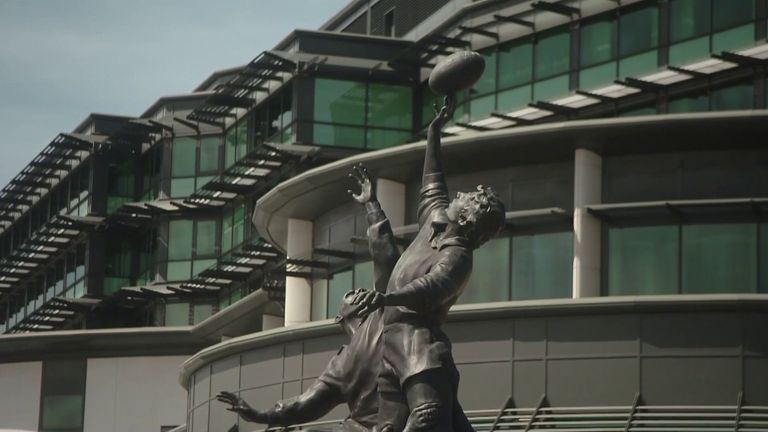Swing Low, Sweet Chariot: RFU will heed players' views, says CEO Bill Sweeney
RFU CEO Sweeney: "The players are key in all this, so we'll consult with as many as we can and get their views and clear opinions."
Tuesday 23 June 2020 10:19, UK
Bill Sweeney says the RFU will listen to the views of players when deciding what course of action to take over the singing of Swing Low, Sweet Chariot at England matches.
England Women's great and RFU Council member Maggie Alphonsi, men's international Maro Itoje and cross-code icon Martin Offiah are among the current and former players who have publicly had their say on the use of the song, which has its origins in the slave trade.
Speaking to the Will Greenwood Podcast, RFU chief executive officer Sweeney explained the governing body are keen to get the views of players before determining an appropriate course of action.
"The players are key in all this, so we'll consult with as many as we can and get their views and clear opinions," Sweeney told Sky Sports.
"I don't think we need to have a separate committee, it'll be the executive and we'll make a recommendation back to the board, discuss it there and take it from there.
"There is a lot of talk of whether it should be banned, but the general feedback we're getting so far - we haven't spoken to all of the players, but we've spoken to quite a few - is actually banning it would cause more of an issue and make it more divisive.
"We've got to be a little bit careful in terms of the steps we take."
The song has long been part of rugby union culture in England, with Sweeney recalling how it was sung during his playing days with Rosslyn Park. However, he admitted to not being a fan of it.
"Personally, I've never liked the song and always felt could we not have a song which was more associated with England," Sweeney said.
"My association goes back to when I was playing in the 1970s and 1980s and it was just all part of rugby culture.
"I think the most important thing to do is make people aware of it and you make a decision in terms of what you do."
Rather than enforcing an outright ban on the song, which Sweeney admits would prove difficult to police, he believes the approach the RFU are taking is the correct one.
The chief executive revealed he has already received plenty of correspondence from both sides of the discussion as well.
"When it came up as a topic recently, we said what we've got to do is review this; probably the best thing we can do is educate people, raise awareness of where the song comes from and what its historical context was...then leave it to people to make an informed, adult decision on it," Sweeney said.
"Opinion seems to be split. I've had a lot of contact from people who say they don't approve of the song being associated with the England team and Twickenham.
"And then probably more people who are saying 'this political correctness gone mad and there are bigger issues to be faced in the topic of diversity'."




